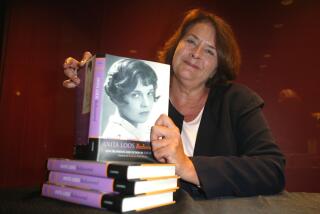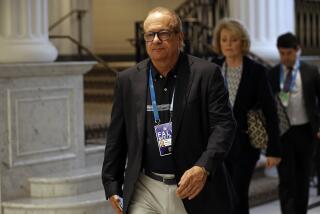Sister Sues Beauchamp Heirs Over Proceeds of Dental Company’s Sale
- Share via
To generations of Southern Californians, Dr. Robert F. Beauchamp was a household name who belonged to an era of Southern California advertising mavericks such as Cal Worthington -- minus the jingle and the animals.
Tagged “the credit dentist,” Beauchamp made millions of dollars offering no-interest credit and inexpensive dental services to the poor. Advertising aggressively via radio, billboards, newspapers and then television in the 1940s and ‘50s, Beauchamp drew hordes of patients.
But now, years after Beauchamp’s death, his 81-year-old sister says she deserves a piece of the dental empire. When Beauchamp’s heirs sold the business last month for about $400 million, Helen Maddocks says, she was cut out.
Maddocks filed suit this month in Los Angeles Superior Court against Beauchamp’s five children, producing a document that her brother allegedly signed in 1939 when he took over their father’s dental offices. If the business were ever sold, the document reads, the proceeds were to be divided equally among Beauchamp, Maddocks and their three siblings.
A few years before Beauchamp’s death in 1998, he transferred his interest in Dr. Beauchamp Western Dental to his children, according to the lawsuit.
The business was sold about a month ago to Citigroup Venture Capital, according to business wire service reports.
According to the suit, Beauchamp’s heirs have refused to pay Maddocks what she believes to be her share.
Maddocks’ younger brother, James Butler Beauchamp, 78, is the only other surviving sibling, said Brian A. Rishwain, Maddocks’ attorney. “We believe he settled claims he had many years ago but don’t know the exact nature of those claims or who they were against,” Rishwain said in an e-mail. He declined to comment further.
The Beauchamps’ lawyer said Maddocks’ suit wouldn’t stand up in court because it was based on an incorrect version of the sale agreement. In 1939, Beauchamp bought his father’s four dental offices for $14,000. The agreement of sale he presented to a Los Angeles probate court for approval mentioned nothing about sharing the business with his siblings, said Dan E. Marmalefsky, the Beauchamps’ attorney.
“This claim is a few decades too old,” Marmalefsky said. “Why wasn’t the claim made from Robert when he was alive? I think the answer is: She waited until one person who would’ve had knowledge of this was no longer alive.”
The document Maddocks produced also suggests that Beauchamp was to make payments to his siblings on a regular basis as long as he owned the dental offices.
“He never made a single payment. That’s pretty good evidence no agreement was ever made,” Marmalefsky said.
Taking a cue from his father who had advertised and offered credit to patients during the Depression, Beauchamp spun his father’s four dental offices into a chain of nearly 200 clinics.
Long before doctors flooded newspapers and television with advertisements for tummy tucks and breast implants, Beauchamp took to the airwaves and offered no-interest credit and discounted rates. His colleagues thought the advertising scandalous and scorned him. They prohibited him from joining the California Dental Assn. Yet Beauchamp clinics became familiar to postwar generations of Californians.
Civic leaders including the late Los Angeles Mayor Tom Bradley praised Beauchamp for serving minorities and low-income patients, although state prosecutors later accused him of exploiting the same patients. He welcomed blacks when other dentists, fearful of offending their white patients, refused to.
In 1985, he established Western Dental Services Inc., one of the nation’s largest dental HMOs. The Orange company has 170 offices in California and Arizona, mostly in mini-malls and marked by bold red, white and blue billboards that target the ethnic minorities whom Beauchamp always served.
In 1997, state prosecutors accused Western Dental of performing unnecessary dental work to maximize profits. Beauchamp settled the charges for $1.7 million without admitting guilt.
Beauchamp gave up his active practice in 1964 to devote time to real estate. Irvine-based Beauchamp Enterprises encompasses marinas, apartments, office complexes and shopping centers and is reportedly worth more than $100 million.
More to Read
Inside the business of entertainment
The Wide Shot brings you news, analysis and insights on everything from streaming wars to production — and what it all means for the future.
You may occasionally receive promotional content from the Los Angeles Times.









